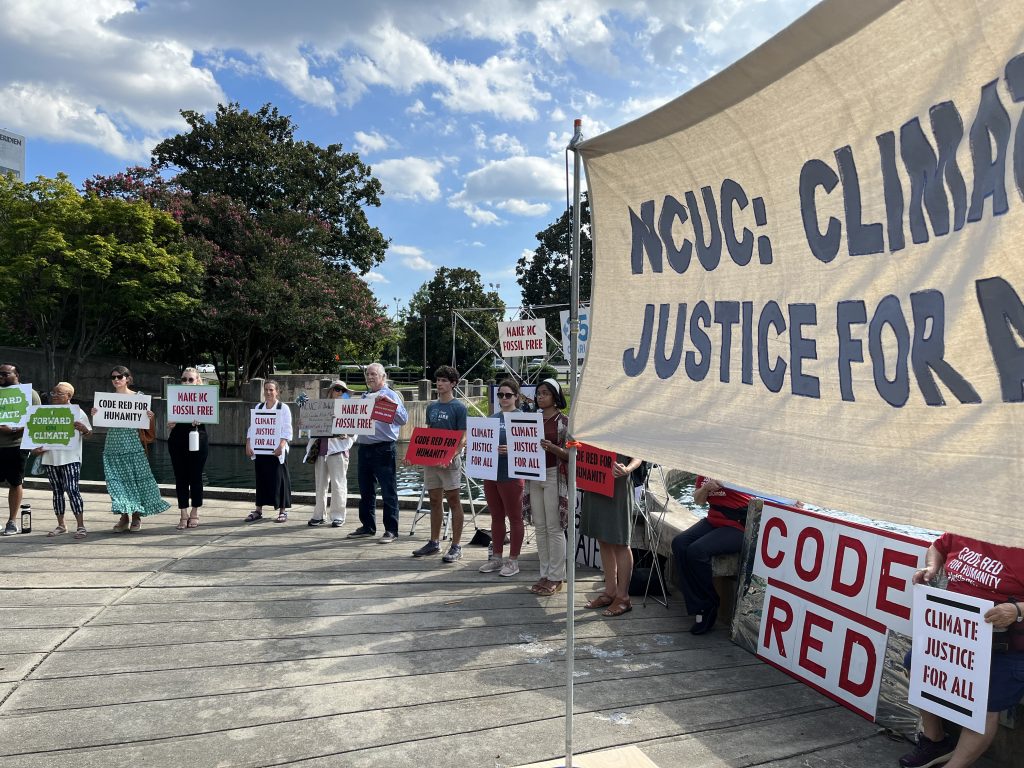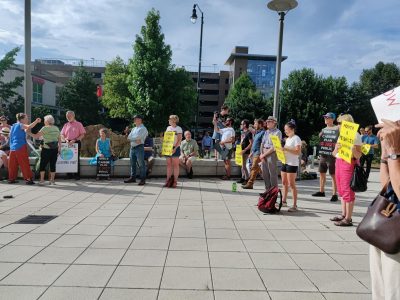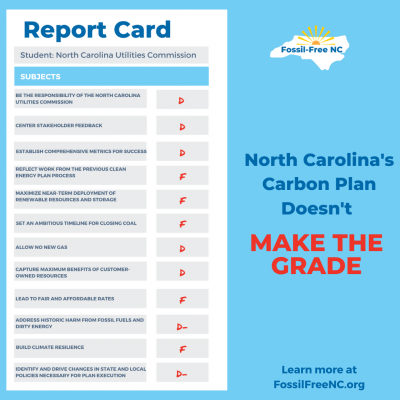Front Porch Blog

Charlotte public hearing on the North Carolina Carbon Plan. Photo by Jennifer Roberts
Since there is so much to review in this plan, we will publish two blog posts following the issue. This first post will provide some context and address why so many are frustrated with the North Carolina Utilities Commission’s decision. The second will look at some specific components of the plan and provide suggestions regarding what to do next and how to stay engaged.
The Carbon Plan emerged from HB 951, legislation passed by the North Carolina General Assembly in 2021. This bill overhauled North Carolina’s energy system and set carbon reduction goals of 70% by 2030 and carbon neutrality by 2050. This bill gave the utilities commission the responsibility of creating a plan to meet these goals — the Carbon Plan. The reduction goals apply to Duke Energy, which directly serves millions of customers across North Carolina, and also supplies much of the energy generation to member-owned electric cooperatives and municipal utilities, meaning this plan will be felt by almost all residents across the state who pay for electricity.
HB 951 required that the commission write the Carbon Plan, but in May 2022, Duke Energy released its own version of the plan, which it asked the commission to approve. The release of Duke’s proposed plan was followed by public hearings across the state along with formal proceedings where environmental organizations, corporations and industry advocates conveyed mainly dismay at Duke’s proposal. Appalachian Voices was one of the interveners in the Carbon Plan proceeding, which means we were able to provide direct recommendations to the utilities commission regarding the plan.

Asheville public hearing on North Carolina Carbon Plan. Photo by Erica Meier, Sunrise Movement AVL
In our testimony, Appalachian Voices addressed affordability, which was supposed to be a key objective of the Carbon Plan. But Duke’s proposal offered few if any guidelines or measures to protect low-income rate-payers, and reflected little regard for energy efficiency and demand-side management. By helping low-income customers weatherize their homes and incentivizing all ratepayers to use less energy during peak hours, these types of programs reduce energy consumption, lower bills, and reduce the energy demand on the grid, thereby lowering costs for all customers, which can also help make the transition to renewable energy more cost effective. Other interveners focused on Duke’s failure to meet the 2030 carbon dioxide emissions deadline, their limited use of solar energy, overreliance on methane gas generation and the complete lack of attention towards environmental justice concerns.
The utilities commission also heard from hundreds of people who attended four different hearings across the state and submitted nearly 500 written comments. I attended three hearings and, while some people did speak favorably on Duke Energy’s proposal, the overwhelming majority of comments were against Duke’s Carbon Plan.

Charlotte public hearing on the NC Carbon Plan. Photo:Jerome Wagner, 350 Charlotte
One comment stood out to me in particular: that the utilities commission should be making this plan, not letting Duke Energy write it, and definitely not leaning too heavily on the investor-owned utility’s proposal, all while ignoring the immense expertise of the various intervenors. The North Carolina Utilities Commission is made up of seven commissioners, all of whom were appointed by Gov. Roy Cooper. Prior to their final order just before New Year’s Eve 2022, I heard a lot of hope among activists that this commission would do the right thing and reject Duke Energy’s plan.
Sadly, the commission did not stand up to Duke Energy and fulfill its legal requirement of publishing its own carbon plan. In most ways, commissioners conceded directly to Duke’s proposals. The commission primarily focused on near-term actions, and the deployment of small scale renewable energy along with gas expansion over the next two years. A new plan will be approved in 2024.
In some ways, the commission’s focus on near-term action is a good thing because it does not appear to convey full approval of Duke’s overall plan. Unfortunately, many of these near-term actions set North Carolina down the wrong path. For instance, the commission did not extend the law’s deadline to cut emissions by 2030, but in Duke’s proposal, three of the four portfolios did not meet the interim 2030 emissions target. By allowing Duke to move forward on near-term actions, like pursuing more methane gas development, the commission tacitly approved steps that push the deadline past 2030, even without formally delaying the state’s goals — the very goals that were set in HB 951 to reduce carbon by 70% by 2030!
Now that Duke has short-term planning approval through the commission’s ruling, it could potentially be hard to prevent these planned developments from moving forward, even before any information is revealed about where these projects will be located or which communities could be impacted. This is particularly true with Duke’s planned deployment of new methane gas plants.
Even worse, pursuing planning and potential development of increasingly expensive energy generation like methane gas locks customers into paying for the projects, even after they are transitioned out of use. For decades, methane gas has commonly been referred to as a cost-effective bridge fuel necessary for the transition to renewables. Our next blog will explore why this is no longer true, and why Duke Energy should not be allowed to lock us into higher rates for decades.

Photo from Fossil Free NC
If you can’t possibly wait for more Carbon Plan news, the People Power NC coalition has released an NCUC Carbon Plan Report Card that reviews the commission’s ruling in great detail. Spoiler alert: It’s a failing grade! Appalachian Voices was a contributing author, along with many amazing organizations across the state.
This fight is far from over, and we will continue to share opportunities to stay engaged and advocate for clean and affordable renewable energy in our state.
PREVIOUS
NEXT
Related News

Leave a comment
Your email address will not be published. Required fields are marked *
